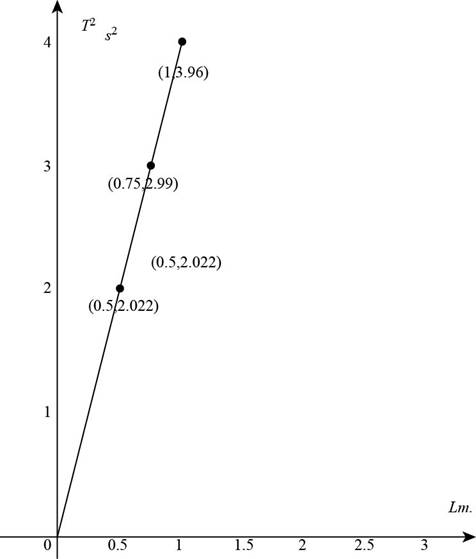
Concept explainers
A small object is attached to the end of a string to form a simple pendulum. The period of its harmonic motion is measured for small
(a)
The period of motion for each length of simple pendulum.
Answer to Problem 15.44P
The period of motion for the length
Explanation of Solution
Given info: The lengths of the simple pendulum are
For the
Here,
Thus, the period for the
For the
Here,
Thus, the period for the
For the
Here,
Thus, the period for the
Conclusion:
Therefore, the period of motion for the length
(b)
The mean value of
Answer to Problem 15.44P
The mean value of
Explanation of Solution
Given info: The lengths of the simple pendulum are
The period of the oscillation of the pendulum is,
Here,
Take square on the both sides and calculate the
Substitute
Thus, the mean value of
Substitute
Thus, the mean value of
Substitute
Thus, the mean value of
Conclusion:
Therefore, the mean value of
(c)
To draw: The graph of
Answer to Problem 15.44P
The graph of

Figure (1)
The value of the
Explanation of Solution
Given info: The lengths of the simple pendulum are
In the part (a), the periods of different given length of pendulum are calculated. Make a table of square of periods
|
|
|
|
|
|
|
|
|
|
|
|
The above table gives ordered pairs.
Take the ordered pairs from above given table and join them by a straight line and plot the graph of

Figure (1)
The Figure (1) shows the graph of
From the above graph, the slope of the line is,
Here,
Substitute
From the equation of the period of the pendulum,
The slope of
So,
(d)
The comparison of values of
Answer to Problem 15.44P
The value of
Explanation of Solution
Given info: The lengths of the simple pendulum are
From part (c) the value of
Both values of
Conclusion:
Therefore, the value of
Want to see more full solutions like this?
Chapter 15 Solutions
EBK PHYSICS FOR SCIENTISTS AND ENGINEER
- pls help on all asked questions kindlyarrow_forward19. Mount Everest, Earth's highest mountain above sea level, has a peak of 8849 m above sea level. Assume that sea level defines the height of Earth's surface. (re = 6.38 × 106 m, ME = 5.98 × 1024 kg, G = 6.67 × 10 -11 Nm²/kg²) a. Calculate the strength of Earth's gravitational field at a point at the peak of Mount Everest. b. What is the ratio of the strength of Earth's gravitational field at a point 644416m below the surface of the Earth to a point at the top of Mount Everest? C. A tourist watching the sunrise on top of Mount Everest observes a satellite orbiting Earth at an altitude 3580 km above his position. Determine the speed of the satellite.arrow_forwardpls help on allarrow_forward
- pls help on allarrow_forward6. As the distance between two charges decreases, the magnitude of the electric potential energy of the two-charge system: a) Always increases b) Always decreases c) Increases if the charges have the same sign, decreases if they have the opposite signs d) Increases if the charges have the opposite sign, decreases if they have the same sign 7. To analyze the motion of an elastic collision between two charged particles we use conservation of & a) Energy, Velocity b) Momentum, Force c) Mass, Momentum d) Energy, Momentum e) Kinetic Energy, Potential Energyarrow_forwardpls help on all asked questions kindlyarrow_forward
- pls help on all asked questions kindlyarrow_forward17. Two charges, one of charge +2.5 × 10-5 C and the other of charge +3.7 × 10-6 C, are 25.0 cm apart. The +2.5 × 10−5 C charge is to the left of the +3.7 × 10−6 C charge. a. Draw a diagram showing the point charges and label a point Y that is 20.0 cm to the left of the +3.7 × 10-6 C charge, on the line connecting the charges. (Field lines do not need to be drawn.) b. Calculate the net electric field at point Y.arrow_forward3arrow_forward
 Physics for Scientists and Engineers: Foundations...PhysicsISBN:9781133939146Author:Katz, Debora M.Publisher:Cengage Learning
Physics for Scientists and Engineers: Foundations...PhysicsISBN:9781133939146Author:Katz, Debora M.Publisher:Cengage Learning Principles of Physics: A Calculus-Based TextPhysicsISBN:9781133104261Author:Raymond A. Serway, John W. JewettPublisher:Cengage Learning
Principles of Physics: A Calculus-Based TextPhysicsISBN:9781133104261Author:Raymond A. Serway, John W. JewettPublisher:Cengage Learning Classical Dynamics of Particles and SystemsPhysicsISBN:9780534408961Author:Stephen T. Thornton, Jerry B. MarionPublisher:Cengage Learning
Classical Dynamics of Particles and SystemsPhysicsISBN:9780534408961Author:Stephen T. Thornton, Jerry B. MarionPublisher:Cengage Learning University Physics Volume 1PhysicsISBN:9781938168277Author:William Moebs, Samuel J. Ling, Jeff SannyPublisher:OpenStax - Rice University
University Physics Volume 1PhysicsISBN:9781938168277Author:William Moebs, Samuel J. Ling, Jeff SannyPublisher:OpenStax - Rice University Modern PhysicsPhysicsISBN:9781111794378Author:Raymond A. Serway, Clement J. Moses, Curt A. MoyerPublisher:Cengage Learning
Modern PhysicsPhysicsISBN:9781111794378Author:Raymond A. Serway, Clement J. Moses, Curt A. MoyerPublisher:Cengage Learning Physics for Scientists and EngineersPhysicsISBN:9781337553278Author:Raymond A. Serway, John W. JewettPublisher:Cengage Learning
Physics for Scientists and EngineersPhysicsISBN:9781337553278Author:Raymond A. Serway, John W. JewettPublisher:Cengage Learning





